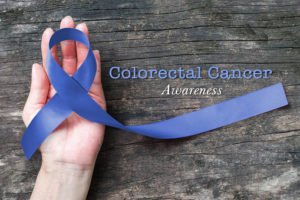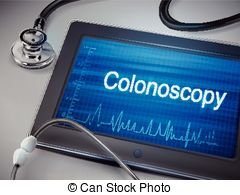
Colorectal cancer is the second leading cause of cancer death in the United States and affects both men and women of all fitness levels. More than 140,000 Americans are diagnosed with colorectal cancer each year. Designated in 1999, March is Colorectal Cancer Awareness Month, a time to recognize the signs of colorectal cancer and to urge preventative screenings for the disease, which can detect early signs of trouble.
What Is Colorectal Cancer?
Colorectal cancer, oftentimes referred to as colon cancer or rectal cancer, is a type of cancer that affects most of the large intestine (colon) and the rectum. The colon is a muscular tube approximately five to six feet in length that connects the small intestine to the rectum. The rectum is a five- to six-inch chamber connecting the colon to the anus.
Although it can occur at any age, colorectal cancer typically affects older adults. It often begins as small noncancerous (benign) polyps that form inside the colon. With time, the polyps can grow into colon cancer.
Polyps tend to be small and produce few or no symptoms. To detect polyps, doctors recommend regular screening test to detect polyps and remove them before they turn into cancer.
Colon cancer can be treated with surgery, radiation therapy, and chemotherapy. For further information on the stages of colorectal cancer and treatments, visit the Cleveland Clinic website.
Symptoms of Colorectal Cancer
Visit a doctor if the following signs of colorectal cancer are present:
- A persistent change in bowel habits, including diarrhea, incontinence, constipation, or consistency of the stool

- Rectal bleeding or blood in the stool
- Unexplained anemia, a shortage of red blood cells
- Persistent abdominal pain, cramps, bloating, or gas
- A feeling that the bowel is not emptying completely
- Weakness or fatigue
- Unexplained weight loss
- Vomiting
Regular cancer screenings, such as a colonoscopy or an at-home stool DNA test, are recommended for everyone since many people with colon cancer do not experience symptoms in the early stages of the disease. Symptoms that later appear can vary depending on the tumor’s size and location in the colon.
Causes of Colorectal Cancer
Colorectal cancer develops when the DNA in cells in the colon and rectum develop mutations that make them unable to control growth and division.
Although the exact cause of colorectal cancer is unknown, known risk factors include the following:
- Family history: Inherited genes, shared environmental factors or both
- Inherited syndromes: The two most common are familial adenomatous polyposis (FAP) and hereditary nonpolyposis colorectal cancer (HNPCC),
- Racial and ethnic backgrounds: African Americans and Ashkenazi Jews (Jews from Eastern Europe) have the highest rates of colorectal cancer in the United States.
- Low-fiber, High-fat diet: Especially diets high in red meat or processed meats, and cooking meats at extreme temperatures
- Inactive lifestyle
- Smoking
- Heavy alcohol use
- Age: Nearly 95 percent of colorectal cancers occur in people age 45 or older
- History of colorectal cancer or polyps
- History of inflammatory bowel disease (IBD), including ulcerative colitis and Crohn’s disease
- Obesity
- Type 2 diabetes
Screening for Colorectal Cancer
In 2018, the American Cancer Society modified its guidelines to begin screenings for average-risk people at age 45 instead of 50. People with a family history of colorectal polyps or cancer, or those with IBD, are encouraged to begin screening before age 45. (A family history of the disease accounts for 10 percent to 30 percent of diagnoses.) African Americans have a 20 percent higher incidence of colorectal cancer than whites and are more prone to early onset colorectal cancer. At this time, guidelines are being considered to lower the initial screening age for this group.
Types of tests to screen for colorectal cancer include the following procedures:
- Colonoscopy uses a flexible scope to view the rectum and entire colon.

- Flexible sigmoidoscopy uses a camera to see inside the rectum and lower colon.
- Fecal immunochemical tests look for blood in the stool.
- Guaiac-based fecal occult blood test (gFOBT) also looks for blood in the stool by way of chemical reaction.
- Fecal DNA test detects genetic mutations and blood products in the stool.
- Double contrast barium enema is given before an X-ray exam of the colon and rectum is performed.
- CT colonography (virtual colonoscopy) is a CT scan of the abdomen and pelvis after drinking contrast dye and inflating contrast dye and air into the rectum.
Polyps seen in colonoscopies will be immediately removed and diagnosed in a lab.
Reducing the Risk of Colorectal Cancer
The risk of colorectal cancer can be reduced by taking the following steps:
- Eating a variety of foods that contain fiber, vitamins, minerals, and antioxidants, including fruits, vegetables, and whole grains
- Limiting or eliminating alcohol
- Not smoking
- Exercising most days of the week for at least 30 minutes at a time
- Maintaining a healthy weight
Support
The American Cancer Society (ACS) offers a wealth of resources on colorectal cancer, including a link to online support groups. Visit the ACS website to join the Cancer Survivors Network, a community of people whose lives have been touched by cancer.
For information on local resources, the ACS has a dedicated page offering assistance in finding services that include Road to Recovery (free rides to treatment), advocacy, cancer information (800-227-2345), and lodging when cancer treatments are needed far from home. Visit the ACS website, for more information.
The San Diego chapter of the ACS is located at 5333 Mission Center Road, suite 105, in San Diego, and can be reached by phone 24 hours a day, seven days a week, at 800-227-2345.
Herrick Library Resources
The following books and DVDs are part of the Herrick Library collection and can be reserved and checked out via curbside pickup:
- American Cancer Society’s Complete Guide to Colorectal Cancer, by Bernard Levin, et al., eds
- Answers to Questions About Colorectal Cancer, by Lynn Prowitt
- Colon Cancer, by the National Comprehensive Cancer Network
- Johns Hopkins Medicine Patients’ Guide to Colon and Rectal Cancer, by Nita Ahuja and Brenda Nettles
- Understanding the Human Body: An Introduction to Anatomy and Physiology, by Anthony Goodman (DVD)
Sources: American Cancer Society, Connecting with Your Local American Cancer Society, https://www.cancer.org/about-us/local.html; Cancer Treatment Centers of America, Colorectal Cancer Risk Factors, https://www.cancercenter.com/cancer-types/colorectal-cancer/risk-factors; Cleveland Clinic, Colorectal (Colon) Cancer, https://my.clevelandclinic.org/health/diseases/14501-colorectal-colon-cancer; Colorectal Cancer Alliance, March Is National Colorectal Cancer Awareness Month, https://www.ccalliance.org/about/awareness-month; Harvard Health Publishing, Racial Disparities and Early-Onset Colorectal Cancer: A Call to Action, https://www.health.harvard.edu/blog/racial-disparities-and-early-onset-colorectal-cancer-a-call-to-action-2021031722136
Graphics: Pixabay; Can Stock Photo

